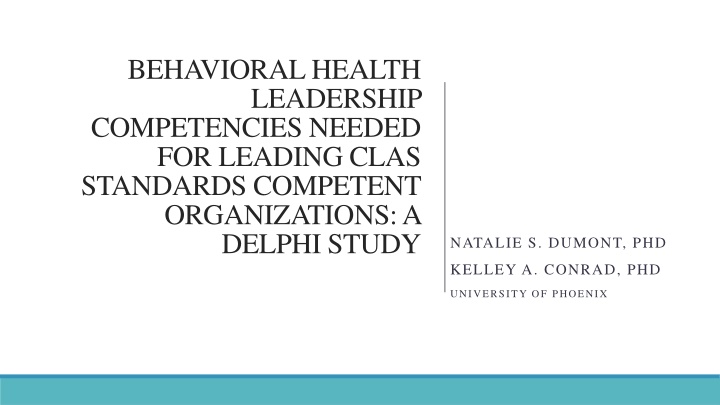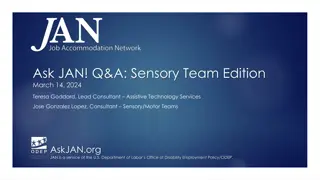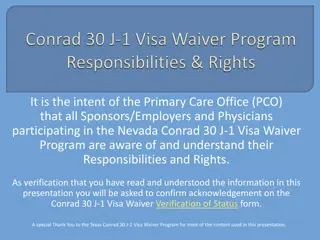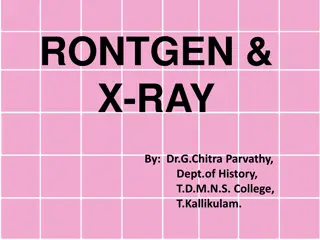Core Leadership Competencies in Behavioral Health for CLAS Standards Competent Organizations
Health disparities in healthcare and mental health organizations are linked to the failure to implement CLAS Standards. This study identifies core leadership competencies required for executive behavioral health leaders to effectively lead CLAS Standards competent organizations. The Delphi study aimed to gather expert opinions and achieve consensus on these competencies for the future benefit of healthcare organizations.
Download Presentation

Please find below an Image/Link to download the presentation.
The content on the website is provided AS IS for your information and personal use only. It may not be sold, licensed, or shared on other websites without obtaining consent from the author.If you encounter any issues during the download, it is possible that the publisher has removed the file from their server.
You are allowed to download the files provided on this website for personal or commercial use, subject to the condition that they are used lawfully. All files are the property of their respective owners.
The content on the website is provided AS IS for your information and personal use only. It may not be sold, licensed, or shared on other websites without obtaining consent from the author.
E N D
Presentation Transcript
BEHAVIORAL HEALTH LEADERSHIP COMPETENCIES NEEDED FOR LEADING CLAS STANDARDS COMPETENT ORGANIZATIONS: A DELPHI STUDY NATALIE S. DUMONT, PHD KELLEY A. CONRAD, PHD UNIVERSITY OF PHOENIX
Overview Introduction Research Topic and Importance Literature Review Methodology Results Conclusions and Implications of the Study Results Significance and Recommendations for Future Research Q & A
Research Topic & Importance Health disparities and inequity exist in healthcare and mental health organizations. A documented reason for such disparities and inequity is failure to adopt and implement the National Culturally and Linguistically Appropriate Services (CLAS) Standards. Health disparities and inequitable care affect all populations, are significant amongst racial and ethnic minorities, and cost organizations over $400 billion per year and $1.2 trillion over 4 years. Study Problem: Existing executive behavioral health leaders may not have the core leadership competencies needed to lead a CLAS Standards competent organization and workforce. Study Purpose: The purpose of the qualitative Delphi study was to solicit the opinion of experts and achieve consensus on the core leadership competencies executive behavioral health leaders must demonstrate in the future to effectively lead CLAS Standards competent organizations. Who else will benefit from known competencies for executive behavioral health leaders to lead CLAS Standards competent organizations?
Conceptual Framework Leadership Competency Delphi Technique National CLAS Standards The Enhanced National CLAS Standards A Blueprint for Implementing and Enhancing the CLAS Standards Importance of CLAS Standards Compliance CLAS Standards and the Law Linking Leadership Competencies to CLAS Standards Executive Behavioral Health Leaders Responsibilities Competencies Knowledge, Skills, and Abilities (KSAs) to Competencies Competencies and Competency Modeling Competency Identification Methods Literature Review The gap in the literature on CLAS Standards was the core leadership competencies executive behavioral health leaders must demonstrate to lead a CLAS Standards competent organization and workforce were unknown.
Research Questions RQ 1: What is the consensus of opinion from a panel of experts about the core leadership competencies behavioral health leaders must demonstrate to lead a CLAS Standards competent organization? RQ 1a: What job tasks must behavioral health executives perform daily to lead a CLAS Standards competent organization effectively? RQ 1b: What are the knowledge, skills, and abilities behavioral health executives must exhibit to perform required daily tasks? RQ 1c: What competencies must behavioral health leaders exhibit to perform required daily tasks?
Methodology Delphi Method Population Study Sample Instrumentation Pilot Study Two Rounds Full Panel Study Four Rounds Sample Selection Expert
Study Results PILOT STUDY AND MAIN STUDY RESULTS
Pilot Study Demographics Attributes Gender Total Male Female Prefer not to respond 3 (42.86%) 4 (57.14%) 0 (0%) Highest degree attained Bachelor s degree Master s degree Doctoral degree Prefer not to respond 0 (0%) 4 (57.14%) 3 (42.86%) 0 (0%) Years of experience as an executive behavioral healthcare leader 0-5 years 5-10 years 10-15 years More than 15 years 1 (14.29%) 1 (14.29%) 1 (14.29%) 4 (57.13%) Number of employees in the Organization 0-50 employees 51-250 employees 251-500 employees 501 or more employees 1 (14.29%) 1 (14.29%) 1 (14.29%) 4 (57.13%)
RQ1a: What job tasks must behavioral health executives perform daily to lead a CLAS Standards competent organization effectively? 1. 2. 3. Direct or coordinate an organization's financial or budget activities to fund operations, maximize investments, or increase efficiency. Appoint department heads or managers and assign or delegate responsibilities to them. Analyze operations to evaluate performance of a company or its staff in meeting objectives or to determine areas of potential cost reduction, program improvement, or policy change. Direct, plan, or implement policies, objectives, or activities of organizations or businesses to ensure continuing operations, to maximize returns on investments, or to increase productivity. Prepare budgets for approval, including those for funding or implementation of programs. Confer with board members, organization officials, or staff members to discuss issues, coordinate activities, or resolve problems. Implement corrective action plans to solve organizational or departmental problems. Direct human resources activities, including the approval of human resource plans or activities, the selection of directors or other high- level staff, or establishment or organization of major departments. Establish departmental responsibilities and coordinate functions among departments and sites. 10.Preside over or serve on boards of directors, management committees, or other governing boards. 11.Negotiate or approve contracts or agreements with suppliers, distributors, federal or state agencies, or other organizational entities. 12.Coordinate the development or implementation of budgetary control systems, recordkeeping systems, or other administrative control processes. 13.Review reports submitted by staff members to recommend approval or to suggest changes. 14.Deliver speeches, write articles, or present information at meetings or conventions to promote services, exchange ideas, or accomplish objectives. 15.Interpret and explain policies, rules, regulations, or laws to organizations, government or corporate officials, or individuals. 16.Prepare or present reports concerning activities, expenses, budgets, government statutes or rulings, or other items affecting businesses or program services. 17.Review and analyze legislation, laws, or public policy and recommend changes to promote or support interests of the general population or special groups. 18.Administer programs for selection of sites, construction of buildings, or provision of equipment or supplies. 19.Direct or conduct studies or research on issues affecting areas of responsibility. 20.Direct or coordinate activities of businesses or departments concerned with production, pricing, sales, or distribution of products. 21.Make presentations to legislative or other government committees regarding policies, programs, or budgets. 22.Refer major policy matters to elected representatives for final decisions. 23.Direct or coordinate activities of businesses involved with buying or selling investment products or financial services. 24.Conduct or direct investigations or hearings to resolve complaints or violations of laws or testify at such hearings. 25.Direct non-merchandising departments, such as advertising, purchasing, credit, or accounting. 26.Prepare bylaws approved by elected officials and ensure that bylaws are enforced. 27.Serve as liaisons between organizations, shareholders, and outside organizations. 28.Attend and participate in meetings of municipal councils or council committees. 29.Represent organizations or promote their objectives at official functions or delegate representatives to do so. 30.Organize or approve promotional campaigns. 31.Identify and develop of leaders who demonstrate cultural humility and cultural responsiveness 32.Create organizational/leader succession plans 33.Mobilize community resources and implement interagency and cross-sector collaborative agreements to address emergency situations and business continuity 4. 5. 6. 7. 8. 9. Experts identified 33 perceived requisite job tasks Of the 33 job tasks, experts perceived 93% (n = 31) as moderately critical, very critical, or extremely critical to lead CLAS Standards competent organizations,
Main Study Demographics Attributes Gender Total Male Female Prefer not to respond 5 (35.71%) 9 (64.29%) 0 (0%) Highest degree attained Bachelor s degree Master s degree Doctoral degree Prefer not to respond 0 (0%) 2 (14.29%) 12 (85.71%) 0 (0%) Years of experience as an executive behavioral healthcare leader 0-5 years 5-10 years 10-15 years More than 15 years 0 (0%) 1 (7.14%) 2 (14.29%) 11 (78.57%) Number of employees in the organization 0-50 employees 51-100 employees 101-250 employees 251-500 employees 501 or more employees 3 (21.43%) 1 (7.14%) 2 (14.29%) 2 (14.29%) 6 (42.85%)
Main Study Results RQ1b: What are the knowledge, skills, and abilities behavioral health executives must exhibit to perform required daily tasks? RQ1c: What competencies must behavioral health leaders exhibit to perform required daily tasks? 8 Knowledge 12 Skills 8 Abilities 15 Competencies
Main Study Results RQ 1: What is the consensus of option from a panel of experts about the core leadership competencies behavioral health leaders must demonstrate to lead a CLAS Standards competent organization? Two most critical competencies Cultural competence and adaptation Collaboration and teamwork 15 Competencies very or extremely critical
Conclusions and Implications 11 of the 15 Competencies very similar to the HLA and NCHL competency frameworks 15 Core Leadership Competencies very or extremely critical
Conclusions and Implications Continued Four unique competencies Cultural competency and adaptation Collaboration and teamwork Care coordination and planning System oriented practice Two most critical competencies Cultural competence and adaptation Collaboration and teamwork
Conclusions: Significance of the Study CLAS Standards leadership competencies Selection tools Added to the overall body of knowledge
Recommendations for Future Research Replicate the study Use alternate methodology for selection Investigate selection and development practices























